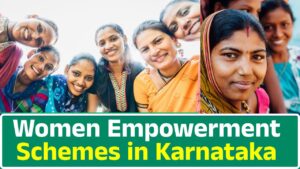Women Empowerment Schemes in Karnataka
Introduction
Women empowerment is central to achieving social equity, economic growth, and sustainable development. In Karnataka, the government has implemented numerous schemes that uplift, support, and enable women—especially those from economically and socially weaker sections. This summary covers all major schemes, their features, eligibility, impact, and future scope.

The Need for Women Empowerment
- Gender Equality: Bridging the socio-economic gap.
- Economic Participation: Enabling self-reliance and entrepreneurship.
- Health & Education: Ensuring maternal health, child welfare, and literacy.
- Social Inclusion: Promoting voice and leadership in families and communities.
Government’s Role in Karnataka
The Karnataka Government has taken a proactive approach to women empowerment by:
- Creating special departments (DWCD – Department of Women and Child Development)
- Launching state-specific welfare and entrepreneurship schemes
- Linking women to SHGs, banks, and training institutions
Top Women Empowerment Schemes in Karnataka
🔹 1. Stree Shakthi Scheme
- Purpose: Promotes self-help groups (SHGs) among women.
- Benefits: Micro-loans, training, marketing support.
- Impact: Empowered over 2 lakh SHGs across Karnataka.
2. Udyogini Scheme
- Objective: Support women entrepreneurs with financial aid.
- Benefits: Subsidized loans up to ₹3 lakhs.
- Eligibility: BPL cardholders, widows, and disabled women.
- Partners: DWCD, banks, NGOs.
3. Bhagyalakshmi Scheme
- Aim: Improve girl child status in poor families.
- Benefits: Bonds, insurance, education support.
- Eligibility: First/second girl child born to BPL family.
4. Mathrushree Scheme
- Support: ₹6,000 cash assistance to pregnant women (BPL).
- Goal: Improve maternal nutrition and safety.
5. Saviruchi Mobile Canteens
- Features: Women-led mobile kitchens serving affordable food.
- Purpose: Employment creation for SHG women.
6. Free Sewing Machine Scheme
- Objective: Promote self-employment among rural women.
- Eligibility: Women aged 20–40 with annual income < ₹1.5 lakhs.
- Benefit: Free sewing machine + tailoring training.
7. Mahila Samakhya Karnataka
- Focus: Literacy, legal awareness, leadership training.
- Implementation: Community learning centers.
8. Skill Training Programs
- Courses Offered: Tailoring, nursing, data entry, beauty care.
- Outcome: Job placements and self-employment.
9. Kayaka Yojana
- Support: SHG-linked credit with interest subsidies.
- Benefit: Promote collective enterprises.
10. Women Entrepreneurship Subsidy
- Provided By: Karnataka State Women Development Corporation (KSWDC).
- Support: Business loans, tax concessions, infrastructure.
Role of DWCD
The Department of Women and Child Development (DWCD) plays a key role in:
- Implementing schemes across districts
- Disbursing funds and tracking benefits
- Partnering with NGOs, banks, and training centers
- Providing online access through official portals
Website: dwcd.karnataka.gov.in
Eligibility Criteria (Common Across Schemes)
- Resident of Karnataka
- Female applicant aged 18–60 (based on scheme)
- BPL status or SHG membership for many schemes
- Specific conditions for pregnancy/girl child schemes
Documents Required
- Aadhaar Card
- BPL/Ration Card
- Income Certificate
- Passport-size photo
- SHG Certificate (if applicable)
- Birth Certificate (for girl child schemes)
- Bank account details
Application Process
Online Process
- Visit the official website (e.g., DWCD).
- Register with Aadhaar and mobile number.
- Fill the online form.
- Upload required documents.
- Submit & track status.
Offline Process
- Get forms from Anganwadi, Panchayat, or Taluk office.
- Fill and attach documents.
- Submit to local authorities.
- Await verification and approval.
Monitoring & Evaluation
- Dashboards at DWCD for tracking scheme data
- NGO-based third-party audits
- Digital tracking via apps and SMS
- Public feedback through WhatsApp and Gram Sabhas
Impact Assessment
In Rural Karnataka:
- Rise in SHGs and local enterprises
- Increased financial independence
- Improved health and education of women and children
In Urban Karnataka:
- Women-led startups and service ventures
- Increase in digital and financial literacy
- Access to jobs in private sectors through skill training
Challenges Faced by Beneficiaries
- Poor awareness in remote areas
- Technical issues in online applications
- Delay in subsidy/loan release
- Gender bias in conservative families
- Lack of access to markets and e-commerce
Success Stories
- Tailoring Business in Ballari: From housewife to boutique owner via Udyogini loan.
- Saviruchi Canteen in Bengaluru: Woman earns ₹40,000/month running a mobile food van.
- SHG Product Exports: Pickles and organic items from Tumkur SHG now sell on Amazon.
NGO and CSR Role
- NGOs support awareness campaigns and training.
- CSR funds from companies like Infosys, Biocon aid in scheme implementation.
- Partnerships with Flipkart, Amazon for SHG product sales.
Digital Empowerment Tools
- YouTube & WhatsApp for awareness
- SMS updates on scheme status
- DWCD and Seva Sindhu portals for registration
- Digital payment and e-commerce training for SHGs
Scheme Achievements (as of 2025)
- 5 lakh+ women trained
- ₹300 crore+ disbursed
- 2 lakh+ SHGs financially supported
- 1 lakh+ women-led small businesses launched
- Literacy and maternal care improved significantly
Future Roadmap
- One-stop mobile app for all women’s schemes
- Women-only industrial clusters in each district
- Digital marketplace for SHG products
- AI-based training for women in technology sectors
- More maternity welfare coverage for urban poor
Frequently Asked Questions (FAQs)
Q1. Can an urban woman apply for Stree Shakthi?
Yes, if she is part of an SHG.
Q2. What is the age limit for Udyogini?
18 to 55 years (may vary slightly by bank).
Q3. Is there an offline application option?
Yes, through local DWCD, Anganwadi, or Panchayat.
Q4. Can a single mother apply for multiple schemes?
Yes, if she meets the criteria of each.
Q5. Are there help centers?
Yes, at every Taluk/District DWCD office and online.
Conclusion
Karnataka stands at the forefront of empowering women through comprehensive welfare schemes. These programs address financial, educational, health, and entrepreneurial needs, enabling women to become self-sufficient contributors to their families and the economy.
The government’s commitment, combined with civil society and corporate support, ensures that Karnataka’s women are steadily marching toward a more empowered future.
